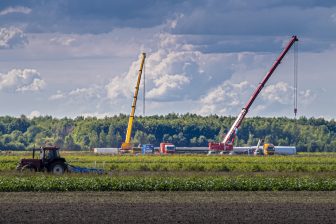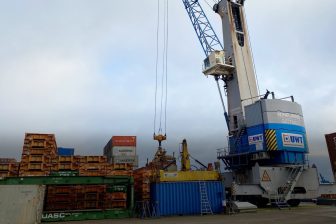ECMT becomes International Transport Forum
Paris, France – The European Conference of Ministers of Transport (ECMT) is an inter-governmental organisation established by a Protocol signed in Brussels on 17 October 1953 that enables ministers responsible for inland transport to co-operate on policy development. It comprises the Ministers of Transport of 44 full Member countries: Albania, Armenia, Austria, Azerbaijan, Belarus, Belgium, Bosnia-Herzegovina, Bulgaria, Croatia, the Czech Republic, Denmark, Estonia, Finland, France, FRY Macedonia, Georgia, Germany, Greece, Hungary, Iceland, Ireland, Italy, Latvia, Liechtenstein, Lithuania, Luxembourg, Malta, Moldova, Montenegro, Netherlands, Norway, Poland, Portugal, Romania, Russia, Serbia, Slovakia, Slovenia, Spain, Sweden, Switzerland, Turkey, Ukraine and the United Kingdom. There are seven Associate member countries (Australia, Canada, Japan, Korea, Mexico, New Zealand and the United States) and one Observer country (Morocco).
The ECMT is administratively part of the Organisation for Economic Co-operation and Development (OECD) and contributes to many of the Organisations’ activities. Its mission is to contribute to developing an efficient transport system that meets environmental and safety standards and to reflect on long-term trends in the transport sector including the implications of increased globalisation.
Until now Ministers have met annually to discuss current themes in transport policy. ECMT has published reports on a wide variety of topics.(*) The ECMT also produces annual statistics on trends in the transport sector.
In January 2004, the ECMT and the OECD brought together their transport research capabilities by establishing the Joint Transport Research Centre. The Centre conducts co-operative research programmes that address all modes of transport and their intermodal linkages to support policymaking throughout member countries.
A new identity
At the Dublin Session on 17 and 18 May 2006, the Council of Ministers took a major decision regarding the ECMT’s future by deciding to transform this organisation into an International Transport Forum. The aim of the new Forum will be to help both policy makers and the general public gain a deeper understanding of the essential role played by transport. Another aim will be to facilitate the integration of transport and logistics into general policymaking while taking account of major considerations with more far-reaching implications such as the economic, environmental and social aspects of sustainable development.
Who will be involved?
The yearly Forum will provide not only Ministers of Transport but key Industry and Society partners with an opportunity to discuss a single topic of global strategic importance, relating to all modes of transport. The founding members of the new International Transport Forum will consist of ECMT Member countries and non-European Associate Member countries. It is subsequently planned to open up participation in the Forum to other countries to make this event an essential annual international meeting for key actors in the transport sector.
Where?
As from May 2008, date of the inaugural Forum, the event will be established permanently in Leipzig, Germany. The city was chosen for its long tradition as a transport hub, its recognised expertise in conference organisation and its vibrant development.
What is new?
From European to global: The reform of the ECMT into the International Transport Forum is a strategic choice and a new commitment. While ECMT had a strong European focus, the Forum will go global since Globalisation and its impact on world-wide trade and travel give flows of traffic new dimensions, new dynamics and create new problems and challenges. The transport sector as a whole needs to look for global answers and solutions.
From closed to open: While the ECMT is a closed meeting of ministers and their delegations, the Forum will be open to the public.
From civil servants to civil society: The Forum will involve representatives of governments and politics, business and industry, research and society. It will be a broad forum of debate and discussion, the world-wide meeting point on transport, logistics and mobility.
From surface transport to all modes of transport: the rapid and dynamic development and growth of all modes of transport makes it necessary to take all of them into consideration.
The challenges
The challenges facing the transport sector to contribute to economic and social cohesion in a sustainable way are so immense that they require wider and deeper discussions and consultations. The globalisation of economic activities and the key role of transport in leading and facilitating this requires more global approaches. The Forum will reflect the importance of transport to everyone, its impact on social activities as well
as on business, industry and trade. It will develop open communication strategies and methods that will facilitate discussion with the widest possible participation.
Commenting on the transformation, Mr. Jack SHORT, Secretary General of the ECMT, stated: “The International Transport Forum will be an excellent platform to highlight and debate transport strategy and transport issues that are relevant globally. I am confident that it will very rapidly establish its role as the primary meeting point for Economic and Sector leaders worldwide.”
(*) Examples of some reports are:
- Cutting Transport CO2 Emissions: What Progress?;
- Young Drivers: The Road to Safety;
- Transport Links between Europe & Asia.
For further titles, see www.cemt.org/pub/puborder.htm#catalogue
U las zojuist één van de gratis premium artikelen
Onbeperkt lezen? Profiteer nu van de introductieaanbieding voor € 10,- per maand.
Bent u al abonnee?



